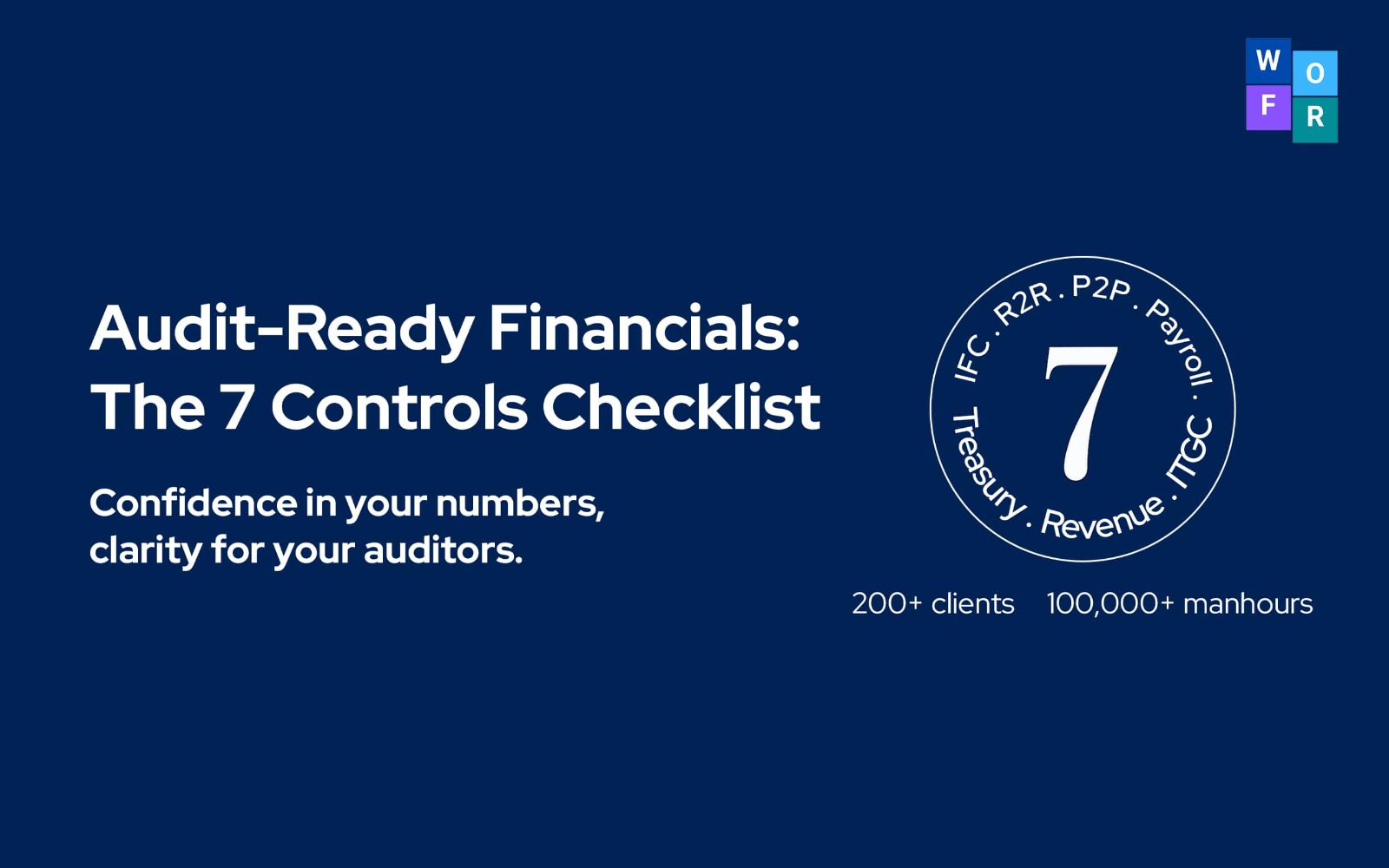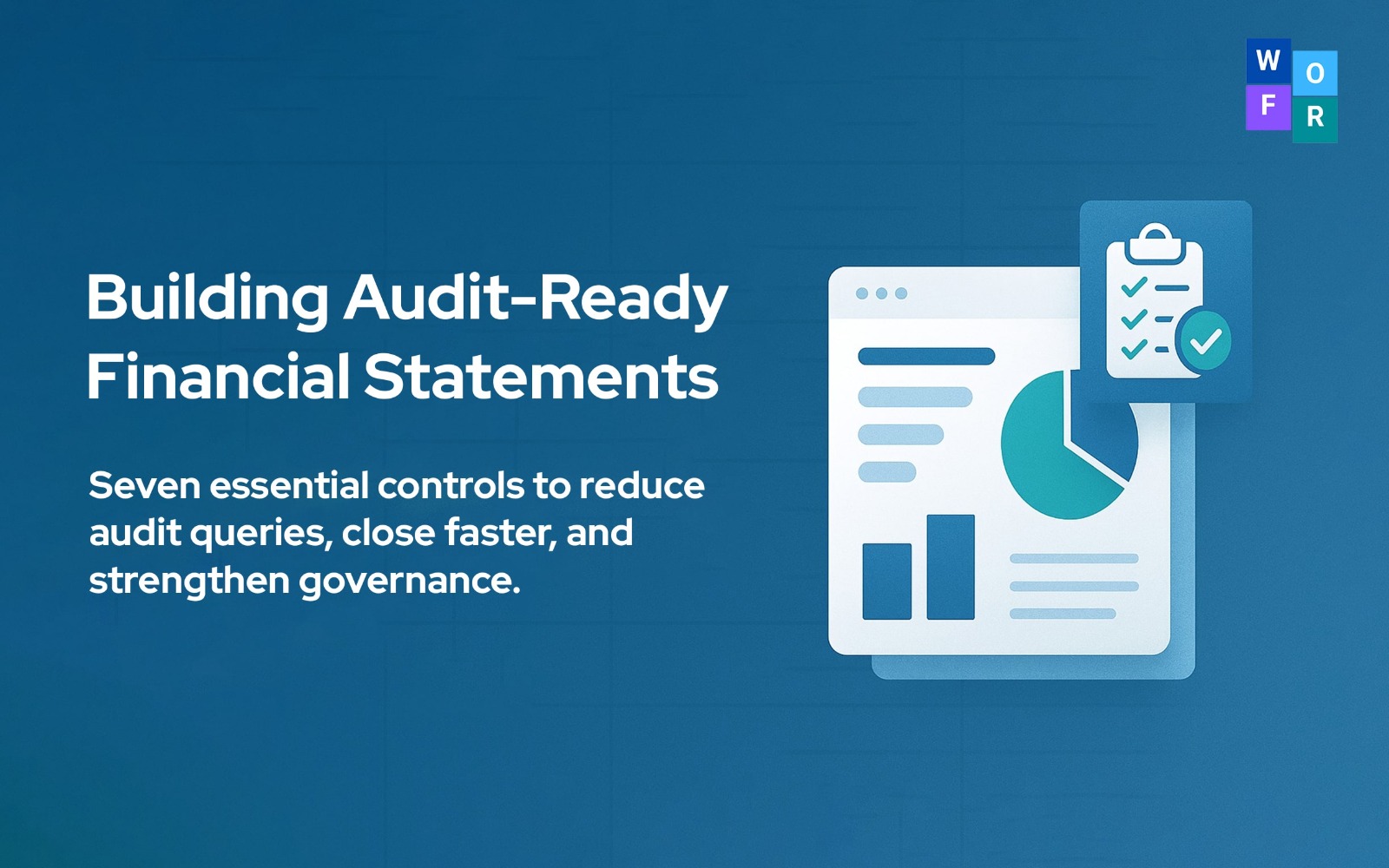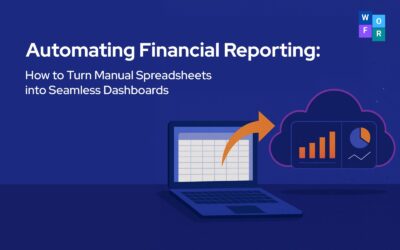Strong internal financial controls (IFC) are the foundation of audit-ready statements, let’s build it through discipline, design and dependable processes!
Audit readiness isn’t an annual scramble, we’re sure that everyone in the business knows this by now!
It’s the outcome of disciplined controls, repeatable processes, and the right technology. Well-designed internal financial controls (IFC) shrink the audit scope, reduce queries, and speed up close cycles. Below are seven practical controls every company should have to produce audit-ready financial statements, and how WOFR’s IFC and Managed Services can help you implement them.
1. Period Close & Reconciliation Controls: Let’s ensure there are no unexplained balances
Why it matters: Unreconciled balances cause audit queries and delay sign-offs.
Core procedures:
- Daily/weekly cash and bank reconciliations; monthly reconciliations for AR, AP, fixed assets, and intercompany.
- Lead schedules that tie to financial statement line items.
- Outstanding item aging and remediation logs.
Audit benefit: Faster audit fieldwork with readily available support for sampled items.
WOFR tip: We deliver reconciliation templates and dashboarded aging reports so auditors find evidence, and not surprises.
2. Procure-to-Pay (P2P) Controls: Stop issues before they hit the P&L
Why it matters: P2P weaknesses lead to misstated expenses, fraud risk, and vendor disputes.
Core procedures:
- PO → GRN → Invoice three-way match before payment.
- Segregation of duties between approvers, payers and reconcilers.
- Vendor master controls and periodic supplier confirmation.
Audit benefit: Clear trail from procurement to payment reduces sampling exceptions.
WOFR tip: We design P2P SOPs and help deploy automated approval flows to minimize manual exceptions.
3. Record-to-Report (R2R) Controls: Get the ledger right, every time!
Why it matters: The general ledger is the source of truth for financial statements. Weak R2R controls create restatements and long audit trails.
Core procedures:
- Standardized chart of accounts and accounting policies.
- Month-end close checklist with ownership and sign-offs.
- Automated recurring journals with approval workflows.
Audit benefit: Fewer post-close adjustments and clear audit evidence for account balances.
WOFR tip: We implement R2R playbooks and automated reconciliations so your close is fast, consistent, and audit-ready.
4. Revenue Recognition & Sales Controls: Defend your top line
Why it matters: Revenue accounting (IFRS 15/Ind AS guidance) is a frequent audit focus area.
Core procedures:
- Contract review checklist to identify performance obligations and variable consideration.
- Policy mapping and disclosure templates for revenue streams.
- System controls to prevent booking outside approved pricing/discount limits.
Audit benefit: Well-documented contract accounting reduces judgment queries and disclosure gaps.
WOFR tip: Our technical accounting team maps contracts to revenue policies and produces audit-ready contract ledgers.
5. Treasury & Cash Management Controls: Protect liquidity and accuracy
Why it matters: Cash misstatements and bank reconciliations trigger major audit attention.
Core procedures:
- Daily bank balance monitoring and independent bank reconciliations.
- Authorization matrix for transfers, loans and hedging.
- Cash forecast vs. actual variance analysis.
Audit benefit: Clear cash controls minimize audit testing and make the entire process seamless.
WOFR tip: We help design treasury controls and automations that lock down cash visibility and reconcile daily.
6. Payroll & Hire-to-Retire Controls: Don’t let payroll be a hidden risk
Why it matters: Payroll errors affect expenses, taxes, and statutory compliance — all audit hot spots.
Core procedures:
- Payroll inputs validation, tax withholding checks, and payroll reconciliation.
- Access controls for payroll systems and dual approvals for off-cycle payments.
- Periodic headcount reconciliation vs. HR records.
Audit benefit: Clean payroll records may offer tax and other benefits.
WOFR tip: Our Managed Services can run payroll controls and reconcile payroll to the general ledger, lowering audit friction.
7. IT General Controls (ITGC) & Segregation of Duties (SoD): secure your systems and data
Why it matters: Weak ITGC and SoD lead to unsupported entries and control failures across finance systems.
Core procedures:
- User access reviews, privileged account controls, and change management logs.
- Periodic SoD analysis and compensating controls for unavoidable conflicts.
- Backup and disaster recovery validation for financial systems.
Audit benefit: Robust ITGC reduces the need for extensive substantive testing.
WOFR tip: We assess ITGCs, recommend remediations, and document SoD matrices to satisfy auditors and protect your data.
How Controls Reduce Audit Queries: the practical impact!

Well-documented controls create a clear audit trail and reduce auditor skepticism. When controls are tested and proven, auditors can rely more on your internal processes and perform less time-consuming substantive testing. That means fewer audit queries, shorter fieldwork, and lower audit costs, outcomes that WOFR routinely helps clients achieve through our IFC implementations and Managed Services.
Why partner with WOFR?
WOFR combines technical accounting expertise with hands-on Managed Services to implement, document, and test controls that make your financial statements audit-ready. Whether you need a short-term remediation program or ongoing virtual finance coverage, our services are designed to reduce audit friction and strengthen governance.
Visit worldoffinrep.com to learn how WOFR’s IFC and Managed Services can help you produce audit-ready financial statements and spend less time answering queries and more time driving growth!
Ready to reduce audit queries and tighten your controls? Contact WOFR for an IFC assessment and a tailored implementation roadmap.



